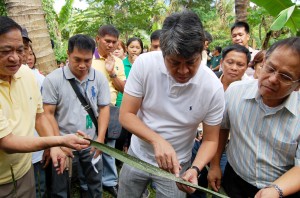Philippine News
Gov’t still finding better ways to address ‘cocolisap’ infestation

Secretary Francis “Kiko” Pangilinan, Presidential Assistant for Food Security and Agricultural Modernization, shows the effect of the coco infestation “Aspidiotus Rigidus” to coconut trees at the sidelines of the launching of “Sama-samang Aksyon ng Gobyerno, Industriya at Pamayanan sa Malawakang Pagsugpo ng Pesteng Cocolisap” (SAGIP) program on Friday (June 20) at Barangay Potol, Tayabas, Quezon. (PNA photo by Gil S. Calinga)
MANILA — Despite a protocol already established by concerned government agencies to address the coconut scale insects or “cocolisap” infestation, better ways to address the issue are still being considered.
Presidential Adviser on Food Security and Agriculture Modernization Francis Pangilinan, in a press conference on Monday, said that while protocols are being implemented, other protocols will be tested.
The protocol involves pruning of the coconut trees as a first step. Afterwards, trunk injection of systemic insecticide will be given. Thirty days after the second step, spraying of organic pesticide will be done.
Two weeks after the organic spray procedure, the handler will then perform the release of biological control agents and finally apply fertilization to help plants recover faster.
“We will not rest until we are able to test those who claim that their procedures and protocols are more effective,” Pangilinan said. “This is a participatory, transparent process. We would like to get as many protocols tested.”
Department of Science and Technology (DOST) Undersecretary for Research and Development Amelia Guevarra expressed confidence that the general protocol would be effective but said that it was also a work in progress.
“We are open to suggestions from groups that claim and have proven safe interventions (to this infestation),” Guevarra said.
With help from experts from the University of the Philippines (UP), they will also assess the area of wide-treatment using satellite imagery.
As for future tests, Guevarra the DOST is planning to fund a study of ecological system that would set up environmental control facilities to study biology and relationship of crops and diseases.
She also said that identification, risk assessment and rapid response to invasive pest species using a science based approach could also be done.
“Hopefully, we’ll be more prepared in the future should other pests come in the country,” Guevarra said.





















